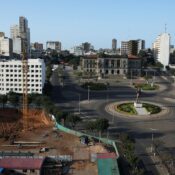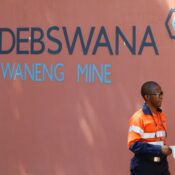
Indications of Senegal’s fiscal deficits increasing before the election
Senegal’s decelerated economic development, its expanding fiscal deficit, and a possible postponement in International Monetary Fund funding may complicate the prospects before the legislative elections on November 17th, according to analysts.
Just five months into his tenure, President Bassirou Diomaye Faye initiated the snap referendum by dissolving the opposition-led National Assembly on Thursday.
Concurrently with the West African nation’s preparations for the next review of the $1.9 billion IMF loan it obtained last year in an effort to stabilize state finances, election plans will now occupy the calendar.
“Senegal’s next review is unlikely to be approved by the IMF board before December,” stated Michael Kafe, an analyst at Barclays, in a note to clients.
Any postponement in the distribution of the next round of funding would align with other unfavorable economic events.
Following a slower-than-expected expansion in the first half, the IMF has revised its growth projection for this year to 6.0%, down from 7.1% in June.
‘The deceleration is a result of reduced activity in the mining, construction, and agro-industrial sectors,’ stated the fund.
Analysts are closely monitoring the political and financial atmosphere leading up to the vote.
Economic inequalities were a contributing factor to some concerns that led to instances of violent protests in 2021. However, there is no indication of recurring unrest in this instance.
Petroleum and gas reservoirs
According to the IMF, government revenue experienced a substantial decline during the initial eight months of this year, but spending came within the expected range.
“As a result, the fiscal deficit expanded, and due to insufficient liquidity reserves, the authorities depended on expensive external commercial borrowing with restricted time durations.”
Senegal’s dollar bonds experienced a little decline on Friday following the disbandment of parliament. The yields for the 2033 and 2048 fixed-term bonds were unchanged on Tuesday, trading at 85.33 cents per dollar and 73.24 cents per dollar, respectively.
Faye, a former tax inspector, attributed his decision to disband it on the previous parliament’s disinclination to enact a new budget law and its resistance against a proposal to eliminate inefficient governmental institutions.
He became victorious in the March presidential election with a 54% share of the vote, mostly fueled by dissatisfaction prevalent among young people. However, his Pastef party held a mere 26 seats in the abolished 165-member parliament. It belonged to a coalition consisting of a total of 56 legislators.
That may change in the November election, according to political risk consultant Eurasia Group, due to the president’s popular initiatives such as a national conversation on court reform and an ongoing financial audit targeting inefficiencies and wastage.
“Throughout history, the outcomes of legislative elections have more closely resembled those of presidential elections when conducted shortly after,” stated Eurasia.
Furthermore, the potential for improved economic conditions in the near future, facilitated by the revenue generated from its recently exploited natural resources, could potentially enhance Faye’s prospects.
With the commencement of production at its Sangomar oil and gas well, Australia’s Woodside Energy (WDS.AX) made Senegal an oil producer in June. The Greater Tortue Ahmeyim liquefied natural gas project, managed by BP (BP. L), is scheduled to commence gas production by the end of this year.
“The present government of Senegal will use these resource revenues to reduce the significant external and fiscal imbalances in the country,” stated Evghenia Sleptsova, an analyst at Oxford Economics, in a research bulletin.
All Categories
Recent Posts
Tags
+13162306000
zoneyetu@yahoo.com


